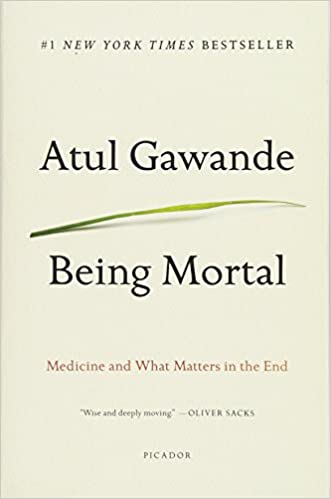Talking about death is one of the most difficult conversations a person can have. It’s safe to say that the majority of people think about death fairly regularly, and yet, this topic is usually avoided at all costs.
It’s extremely difficult to accept other people’s mortality, let alone our own. But, it’s equally important to have this conversation while there’s still time.
Today, we are going to take a look at how to talk about death even if we feel uncomfortable and why it is so important to talk about it.

Being Mortal
by Atul Gawande
⏱ 13 minutes reading time
🎧 Audio version available
Death is inevitable; there’s no way around it– which is what makes this topic so difficult to talk about. We’ve all experienced the death of a loved one, whether it’s a close family member, relative, or friend. The topic of death brings up complicated emotions that we try to stay away from.
According to statistics, 35% of people don’t feel comfortable talking about death. Yet, the majority of people who experience the death of a loved one talk about how they wish they had had more open conversations with the dying person.
But why do people find it so difficult to talk about death?
From the perspective of someone who lost a loved one, being in denial about their loss is one of the main reasons they might not want to talk about death. It is, in fact, the first stage of grief; it’s like a shield or a wall that a person puts up in order to protect themselves from their loss.
The fear of loss, which has been coined thanatophobia, is another reason people might avoid talking about death. While it’s completely normal to be anxious when thinking about the loss of someone we love, it gets borderline worrisome when people start to develop symptoms that affect them physically and mentally.
People with thanatophobia experience symptoms ranging from panic attacks and bouts of extreme sadness and persistent worry to physical symptoms such as nausea, stomach pain, sweating, and irregular heartbeats.
Oftentimes, people fear saying the wrong thing or not knowing what to say when someone loses a loved one. And, of course, they fear their own mortality.
People who are terminally ill or near death, might not be comfortable talking about death as a result of not wanting to feel like a burden to their family and friends. In addition, they might also think discussing death would be upsetting to their loved ones, so they avoid talking about it altogether.
So, how can we talk about death, even if we feel uncomfortable?
Breaking the Ice
People who are near death know what the future has in store for them; however, they might avoid talking about death as a result of thinking that their loved ones won’t be able to handle the truth. This can lead to them feeling isolated and not knowing how to reach out to their loved ones in their time of need.
It’s advised that you talk to a dying person by indirectly mentioning death and seeing if they’re open to talking about it. This can be done by asking if they believe in the afterlife, for example. It’s all about finding a topic that will eventually come around to the subject of death.
It’s also important that you don’t rush this conversation; being open to talking about death is one thing, but feeling pressured to talk about it is completely different. When you’re with a dying person, let them know that you can talk about this topic if/when they’re ready to do so.
It’s Okay to Cry
Crying is the body’s natural response to grieving. And, not only is it okay to cry and express your grief for the life a person is leaving behind, but it’s also okay for the person to know that it’s okay to cry in front of you and to be angry at the situation.
People who are dying generally have complicated feelings about it. Be supportive and give them a shoulder to cry on. Make sure they know you are holding space for them to process those feelings, and that you won’t ignore or invalidate them.
Listen Well
Being attentive to what a person near death has to say is key to open communication. Be respectful of what they believe happens after death and don’t force your religious or spiritual beliefs on them.
Let them know that you are there for them to provide the support or comfort that they might need. Try to ask questions that prompt them to tell you about what they’re feeling.
Don’t Be Afraid to Laugh
‘Laughter’ and ‘death’ rarely end up in the same sentence. People generally have a solemn expression plastered on their faces when talking about death, and there are times that it’s logical to feel that way. However, given the fact that humor is a part of our lives, it should also be a part of dying.
According to research, 85% of people who are in hospice or palliative care initiate humor while talking about death, so why shouldn’t we talk about death with a bit of humor?
Just as humor plays a role in helping to talk about death, it also plays an extremely important role in grieving. When we lose a loved one, the last thing we probably feel like doing is smiling or laughing, to the extent where we may feel like we will never smile again. But, laughter is important when it comes to grief, and it has been proven to reduce anxiety and depression in people who experience loss.
All things considered, the importance of talking about death is something that people often underestimate, because after all, death is a depressing and frightening topic, and there’s always that thought lingering at the back of our minds that, if we talk about death, we might call it to us, like a bad omen.
Other than the fact that talking about it makes it less scary, why does it matter to talk about death?
It Helps Us Appreciate the Little Things in Life
When you embrace the idea of death, it allows you to be more present and focused in the moment. We don’t know what the future holds for us, but we know we are right here, right now, so that’s what we should be focusing on.
We learn to appreciate the smallest things and live life to the fullest. There’s no guarantee that we will live to see tomorrow, so we learn to stop procrastinating and start doing things we’ve always wanted to do. And, instead of worrying and stressing about obstacles and challenges , we learn to let it go and instead practice gratitude.
Whether you choose to embrace death or continue to live in fear is completely your choice. What is important is to live in the moment and make every single one of them count.
It Makes Us Stop Worrying About Things
Worrying about giving a wrong first impression to someone or why your recent date ghosted you are two situations that the vast majority of people have experienced. We tend to worry about the little things, letting that worry consume our thoughts for days– if not months– at a time.
Death puts things into perspective. Would you worry about these things if you knew you didn’t have much time left? Would you let these things overwhelm you and drain your energy when you could be out there, enjoying life?
It Prevents Regret
When you know that the time that we have on earth is limited and accept that thought, you’ll find that you do things differently. We allow ourselves to live more fully and do things that we wouldn’t have done otherwise.
Moreover, open conversations about death prevents regret in a way people don’t realize until they’re faced with a tough situation.
In cases where a person suddenly becomes so ill or injured that they’re unable to make decisions for themselves, their family will have to make those decisions for them. If death was a topic that was avoided throughout that person’s life, the family won’t know they’re making the decision that the person wanted.
What Is Snapreads?

With the Snapreads app, you get the key insights from the best nonfiction books in minutes, not hours or days. Our experts transform these books into quick, memorable, easy-to-understand insights you can read when you have the time or listen to them on the go.


